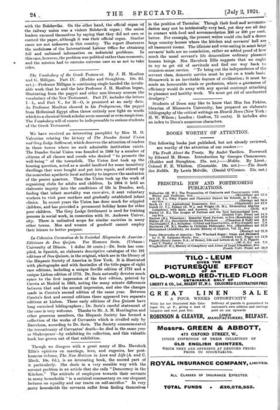Though we disagree with a great many of Mrs. Havelock
Ellis's opinions on marriage, love, and eugenics, her post- humous volume, The New Horizon in Love and Life (A. and C. Black, 10s. 6d.), is an interesting book, the second part of it particularly. She deals in a very sensible way with the servant problem in an article that she calls "Democracy in the Kitchen." The attitude of employers towards their servants in many households "is a satirical commentary on our eloquent lectures on equality and our tracts on self-sacrifice." In very , many households the servants suffer from finding themselves
in the position of Tantalus: Though their food and necomnicp- •
dation may not be intrinsicallrvery bad, yet they are all day in contact with food and accomme4ation 309 or 400 per cent.
better. For example, the present writer could cite half a dozen large country -houses where the kitchen and servants' hall are all basement room.S. The idleness and over-eating in somis large servants' halls are no consolation, rather an added proof of how much the usual servant's life &Moralizes ordinary pleasant human beings. Mrs. Havelock Ellis Suggests that we ought to try to get rid of servitude and find our way back t) common-sense service. "To bring out the independence of the servant class, domestic service must be put on a trade basis. Housework is an inevitable feature of eivilitation; it must be - made an honourable trade or profession, where a guarantee of efficiency would do away with any special contempt attaching to pleasant and healthy work. We must get rid of uneducated drudgery." ,










































 Previous page
Previous page